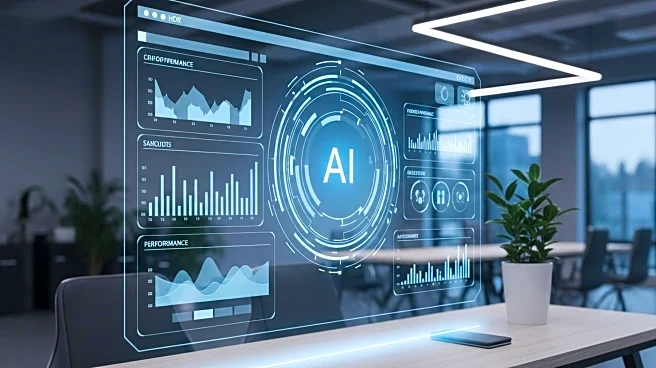What's Happening?
Grace Leung, a digital growth consultant, is helping businesses integrate AI into their workflows to improve employee performance. Leung emphasizes that AI is not meant to replace employees but to assist them in becoming high performers. Since March 2024, she has worked with companies across various sectors, including fintech and e-commerce, to develop AI skills. Leung advises starting with AI tools like ChatGPT, Gemini, and Claud, focusing on creating automated workflow systems. She highlights the importance of proper AI prompting, using AI to create templates, and leveraging AI for data analysis. Leung also addresses concerns about data privacy and the potential replacement of entry-level jobs by AI.
Why It's Important?
The integration of AI in the workplace is significant as it can streamline processes, enhance productivity, and foster innovation. By teaching employees to use AI effectively, businesses can maintain competitiveness in an increasingly digital economy. However, the shift towards AI also raises concerns about data privacy and job displacement, particularly for entry-level positions. Companies must balance automation with upskilling their workforce to ensure long-term sustainability. Leung's approach highlights the need for strategic AI adoption, focusing on enhancing human capabilities rather than replacing them.
What's Next?
As AI continues to evolve, businesses are likely to further integrate these technologies into their operations. Companies may need to establish clear guidelines for AI usage to protect sensitive data and address ethical concerns. Additionally, there may be increased demand for training programs to help employees adapt to AI-driven environments. Stakeholders, including business leaders and policymakers, will need to consider the implications of AI on employment and develop strategies to mitigate potential negative impacts.
Beyond the Headlines
The broader implications of AI integration in the workplace include shifts in organizational culture and the nature of work itself. As AI tools become more prevalent, there may be a need to redefine roles and responsibilities, emphasizing collaboration between humans and machines. Ethical considerations, such as ensuring fairness and transparency in AI decision-making, will also become increasingly important. Long-term, AI could lead to more personalized and efficient work environments, but it requires careful management to avoid exacerbating inequalities.









